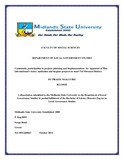Please use this identifier to cite or link to this item:
https://cris.library.msu.ac.zw//handle/11408/2437Full metadata record
| DC Field | Value | Language |
|---|---|---|
| dc.contributor.author | Makavire, Praize | - |
| dc.date.accessioned | 2017-06-30T13:39:29Z | - |
| dc.date.available | 2017-06-30T13:39:29Z | - |
| dc.date.issued | 2014-10 | - |
| dc.identifier.uri | http://hdl.handle.net/11408/2437 | - |
| dc.description.abstract | This research aimed at assessing the contribution of community participation in projects planning and implementation: An Appraisal of Plan international’s water, sanitation and hygiene projects in ward 5 of Mwenezi District. The background of the study focused on the key aspects that led the researcher to be prompted to carry out the research. The research elaborated on the statement of the problem which is the failure of many projects in meeting most of their intended goals due to the top down nature used in the projects. Thus community participation as a strategy in project planning and management and was applied on by donor agencies and the governments in different projects. The study seek to appraise the application of bottom up approach (community participation) in projects implementation focusing on PLAN UNICEF’s water and sanitation projects in ward 5 of Mwenezi District. The research objectives was to identify the types of water and sanitation projects which are being implemented by Plan International’s in ward 5 of Mwenezi District, to assess the nature of community contribution in Plan International’s WASH projects, to explore the complications that hinders community participation, To recommend means of improving bottom up approach in WASH projects. Research questions set to answer the research problems. The research highlighted the significance of the study, justification, limitations and the delimitations of the research. Related literature was reviewed in chapter two to get a greater understanding of the advantages brought by community participation, Complexities to Community Involvement in Project Implementation, Monitoring and Evaluation of Community Participation as well as analyzing the levels of participation using Arnstein 1969‘s participation larder. The researcher used different respondents which comprised of the, councilor ward 5, DA, Rural District council officials and community members in ward 5. Different sampling techniques were used during the collection of data. A combination of purposive or judgmental sampling and stratified sampling techniques were used to draw data from the field. The findings of the research revealed that community participation has contributed to the success of Plan International’s water and sanitation projects and the community contributed about 30 % towards the success of the projects. The levels of community participation has raised from informing where external people (those with power) decide and do things to and for the people, according to their own plans and purpose to partnership where the community will be working hand in glove with the implementing agents and also people in communities initiate action and have ownership, power and control over decision making processes. | en_US |
| dc.language.iso | en | en_US |
| dc.publisher | Midlands State University | en_US |
| dc.subject | Community development | en_US |
| dc.subject | Rural development | en_US |
| dc.subject | Community participation in development | en_US |
| dc.title | Community participation in projects planning and implementation: An Appraisal of Plan International’s water, sanitation and hygiene projects in ward 5 of Mwenezi District. | en_US |
| item.languageiso639-1 | en | - |
| item.fulltext | With Fulltext | - |
| item.grantfulltext | open | - |
| Appears in Collections: | Bsc Local Governance Studies Honours Degree | |
Files in This Item:
| File | Description | Size | Format | |
|---|---|---|---|---|
| Makavire.pdf | Full text | 1.18 MB | Adobe PDF |  View/Open |
Page view(s)
106
checked on Apr 14, 2025
Download(s)
96
checked on Apr 14, 2025
Google ScholarTM
Check
Items in MSUIR are protected by copyright, with all rights reserved, unless otherwise indicated.



